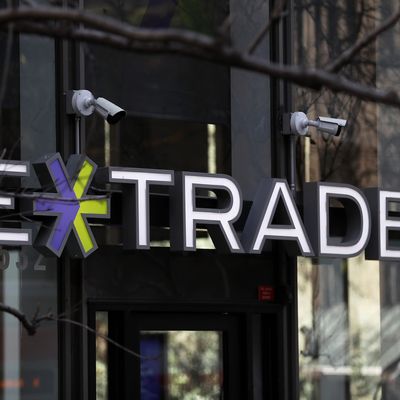
It seems as if these should be lean times in the consumer brokerage business, with all the major online stockbrokers cutting their commissions on stock trades to $0. But as I wrote back in October, when Charles Schwab made the move that drove commissions to $0 across the industry, it’s possible to give out free trades because the real profits in the brokerage business come from holding your customers’ lucrative cash deposits:
Fifty-seven percent of Schwab’s revenue last year came from net interest margin, which is to say, borrowing money at interest rates below those at which it lends the money out. Schwab pays accountholders a little bit of interest on their cash balances (0.27 percent, on average, in 2018) and earns a lot more interest by lending those balances out (2.57 percent, again in 2018). If Schwab makes its brokerage product more attractive by offering zero-fee trades, that may induce customers to bring more business to Schwab, including more cash balances, which Schwab can earn a net interest margin on.
So after Schwab bought TD Ameritrade, I’m not surprised to see that the next-biggest online broker, E-Trade, is getting bought by Morgan Stanley, which has an investment-banking business and a wealth-management business aimed at wealthy individuals who pay human advisors to manage their money. E-Trade will give Morgan Stanley a huge number of new, less wealthy retail customers, but most important, E-Trade will also give Morgan Stanley a new pool of cheap cash deposits on which it doesn’t have to pay much interest. CNBC notes:
Morgan Stanley will gain access to E-Trade’s $56 billion in deposits. In the past, the bank has struggled to raise deposits to fund loans to its wealthy clientele, relying on high-interest CD promotions. That will lower its funding costs by about $150 million, on top of the $400 million in other savings Morgan Stanley says the deal will bring.
Essentially, E-Trade is better than Morgan Stanley at borrowing, and Morgan Stanley is better than E-Trade at lending. So putting the two together should make for a more efficient and more profitable bank than if they stayed separate. There’s also some synergy, because mass-affluent customers of discount brokerages like E-Trade sometimes age into wealthy customers who become good fits for Morgan Stanley’s more traditional wealth-management business.
The main lesson here for retail-brokerage clients is that they should consider whether they as customers are more lucrative than they should be. Are you part of the reason E-Trade was an attractive acquisition for Morgan Stanley because you are holding too much of your brokerage account in low-interest cash deposits?
I’m not saying you should hold no cash; you need some cash or cash-equivalent holdings to pay everyday expenses. And you may want more cashlike holdings if you’re at or near retirement age and need to avoid investment risk. But if you have cash that’s just sitting in your account for no reason — say, it was deposited, and you didn’t get around to investing it yet — go ahead and put it into something that’s likely to pay you a higher return. There’s no reason to let your broker collect a net interest margin on deposits you don’t actually need to be holding in cash.





























